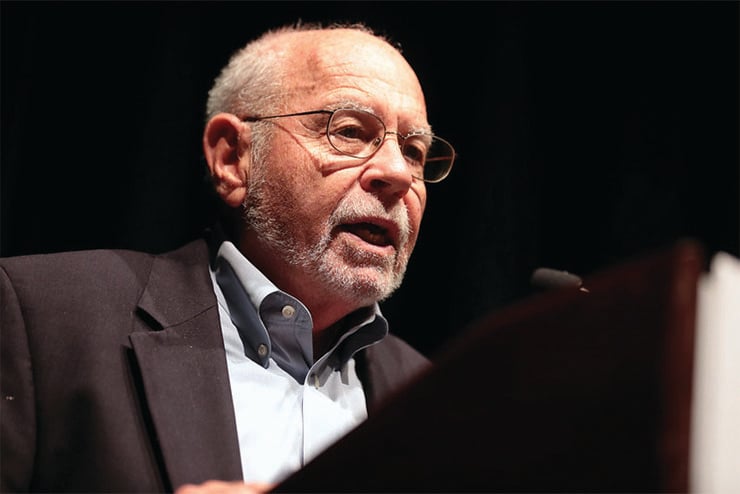National Review writer Michael Brendan Dougherty recently posted remarks about my life and activities in the course of reviewing the book I edited, Paleoconservatism: An Anthology. I will try to temporarily restrain myself from rehashing old grievances with Dougherty’s magazine to note that his depiction of me, and some of his observations about paleoconservatives in general, are at least plausible if not exactly a panegyric. He also, to his credit, defended paleos against a recent, inane charge of being “right-wing Marxists” and did so very publicly on Twitter.
Contrary to what Dougherty states, however, Jacob Siegel’s 2016 essay about my personality published in Tablet and linking me falsely through guilt by association to white nationalism, was not in any conceivable sense “positive.” I’m also not sure that I mischaracterized The New York Times’ “conservative” columnist Ross Douthat as “conventionally center-left.”
Dougherty then goes on to offer this accurate, though apparently disapproving, biographical description: “A prolific academic writer on the topics of Marxism and fascism, Gottfried is a scabrous critic of the mainstream right, which he saw as seeking a role as an acceptable opposition to a hegemonic American Left.”
If others think I’m too harsh in my judgment of the conservative establishment, then I’ll ask whether the American right has achieved anything of great moral or political value by pursuing its strenuous exclusionary club membership policies. Yes, I know those policies have helped ambitious, self-described conservatives advance their journalistic careers. These folks have certainly done well for themselves by building bridges to the center and left. They have also, not incidentally, kept out of their club anyone who seems excessively conservative in a way that might unsettle their leftist contacts.
But it’s not clear that this course of action has advanced what used to be accurately described as “the Right.” Present exclusionary practices have not strengthened the position of social traditionalists; nor have they done anything to restrain the deep state. The accommodationist right obligingly went along with toppling Confederate statues, but it did offer a demur when a similar fate befell the stony likenesses of Washington, Jefferson, and Lincoln. The same accommodationists have acquiesced in and sometimes cheered the elevation of gay marriage to a family value. Meanwhile, conservative channels recruit as showcase celebrities proudly self-identified gays and even transgendered Republicans. As I have frequently noted, our authorized conservative movement, represented ably at National Review, stands well to the left, particularly on social issues, of where the American left center was located 50 years ago.
Dougherty’s narrative does explain by indirection the attempts of conservative establishment publications to ignore my books and those of other paleoconservatives and to avoid any mention of our names. We are bad at following party lines. We have no interest in allowing the “movement” to determine our beliefs.
In any case, I’m not sure the gatekeeping to which paleoconservatives have been subject for many decades has really prevented our ideas from surfacing. The “Freedom Conservatism” rebranding of Bush-era neoconservatism recently endorsed by National Review seems closely linked to that publication’s earlier gatekeeping efforts. Unfortunately for “Freedom Conservatives” and their donors, the forces on the populist right that they are resisting come from a much younger generation than mine and are already too numerous and well-mobilized to be marginalized.
I would also note that my disagreements with the conservative establishment, in the maw of which Dougherty labors, have nothing to do with the Alt-Right or any other term that is in bad odor with the media. My differences with Dougherty’s employers go back to the 1980s, when my comrades-in-arm were the traditional conservatives who opposed the neoconservative power grab.
Lately I’ve been criticizing Conservatism Inc., by which I mean the mechanism of conservative institutional control by neoconservatives, for indiscriminately branding what it doesn’t like as “Marxist.” This practice is at least partly rooted in a fear of offending donors and media allies by going after the woke left with what may seem excessive zeal. It may be less risky to rage against socialism than to warn against the implications of gay marriage or the LGBT agenda pushed by American elites. Calling Democrats “Marxists” strikes me as an avoidance of the real crisis that has engulfed us. It is one in which a multitude of corporate capitalists rather than workers are found in the revolutionary vanguard.
In a society that denigrates white Americans shamelessly, it is, moreover, astounding that establishment conservatives should be acting as an auxiliary force in the left’s war against “white racism.” There is vicious, even scatological hate speech now directed at American whites thanks to our media and what pretends to be higher education. Why exactly is this cascading torrent of hate less upsetting to our establishment conservatives than an occasionally indelicately expressed observation about racial minorities by a white person?
In any case, I shouldn’t be complaining that a writer for the establishment has paid non-hostile attention to my activities. If this is the season to be indulgent to uncongenial critics, then perhaps it was time to pull me out of limbo. But these overtures may be of little value to those who are making them. I no longer hope to right the course of a conservative movement that has continued moving to the left for the past 70 years, and which will likely continue to do so long after I’m gone.

Leave a Reply